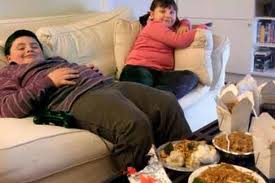 A new study that takes a complete snapshot of adolescent cardiovascular health in the United States reveals a dismal picture of teens likely to die of heart disease at a younger age than adults do today, reports Northwestern Medicine research.
A new study that takes a complete snapshot of adolescent cardiovascular health in the United States reveals a dismal picture of teens likely to die of heart disease at a younger age than adults do today, reports Northwestern Medicine research.
“We are all born with ideal cardiovascular health, but right now we are looking at the loss of that health in youth,” said Donald Lloyd-Jones, MD, chair and associate professor of preventive medicine at Northwestern University Feinberg School of Medicine. “Their future is bleak.” The effect of this worsening teen health is already being seen in young adults. For the first time, there is an increase in cardiovascular mortality rates in younger adults ages 35 to 44, particularly women, Lloyd-Jones said.
The alarming health profiles of 5,547 children and adolescents, ages 12 to 19, reveal many have high blood sugar levels, are obese or overweight, have a lousy diet, don’t get enough physical activity and even smoke, the new study reports. These youth are a representative sample of 33.1 million U.S. children and adolescents from the 2003 to 2008 National Health and Nutrition Examination Surveys.
“Cardiovascular disease is a lifelong process,” Lloyd-Jones said. “The plaques that kill us in our 40s and 50s start to form in adolescence and young adulthood. These risk factors really matter.”
“After four decades of declining deaths from heart disease, we are starting to lose the battle again,” Lloyd-Jones added.
The American Heart Association (AHA) defines ideal cardiovascular health as having optimum levels of seven well-established cardiovascular risk factors, noted lead study author Christina Shay, who did the research while she was a postdoctoral fellow in preventive medicine at Feinberg. “What was most alarming about the findings of this study is that zero children or adolescents surveyed met the criteria for ideal cardiovascular health,” Shay said. “These data indicate ideal cardiovascular health is being lost as early as, if not earlier than the teenage years.”
The study used measurements from the American Heart Association’s (AHA) 2020 Strategic Impact Goals for monitoring cardiovascular health in adolescents and children. Among the findings:
Terrible Diets: All the 12-to-19-year-olds had terrible diets, which, surprisingly, were even worse than those of adults, Lloyd-Jones said. None of their diets met all five criteria for being healthy. Their diets were high in sodium and sugar-sweetened beverages and didn’t include enough fruits, vegetables, fiber, or lean protein.“They are eating too much pizza and not enough whole foods prepared inside the home, which is why their sodium is so high and fruit and vegetable content is so low,” Lloyd-Jones said.
High Blood Sugar: More than 30 percent of boys and more than 40 percent of girls have elevated blood sugar, putting them at high risk for developing type 2 diabetes.
Overweight or Obese: Thirty-five percent of boys and girls are overweight or obese. “These are startling rates of overweight and obesity, and we know it worsens with age,” Lloyd-Jones said. “They are off to a bad start.”
Low Physical Activity: Approximately 38 percent of girls had an ideal physical activity level compared to 52 percent of boys.
High Cholesterol:
Girls’ cholesterol levels were worse than boys’. Only 65 percent of girls met the ideal level compared to 73 percent of boys.
Still Smoking: Almost 25 percent of teens had smoked within the past month of being surveyed.
Blood Pressure: Most boys and girls (92.9 percent and 93.4 percent, respectively) had an ideal level of blood pressure. The problem won’t be easy to fix. “We are much more sedentary and get less physical activity in our daily lives,” Lloyd-Jones said. “We eat more processed food, and we get less sleep. It’s a cultural phenomenon, and the many pressures on our health are moving in a bad direction. This is a big societal problem we must address.”
Source: Northwestern NewsCenter

Comments